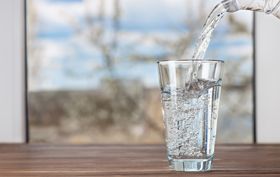6 Best Water Filters for Hard Water: Making Every Sip a Purer Pleasure
Feeling the effects of hard water? Filter out the bad, keep the good with the right tools
Updated February 4, 2025

Ever feel like your soap isn't lathering as well as it should? Or notice a stubborn white buildup on your faucets? These could be signs of hard water lurking in your pipes.
Hard water, packed with calcium and magnesium minerals, can wreak havoc on your plumbing, appliances, and even your body. By understanding the impact of hard water and taking steps like using a proper filter, you can enjoy cleaner, smoother, and more efficient water flow throughout your home.
Our 6 Best Filters for Hard Water
- Best water filter overall - MAYU FULL CYCLE | Waterdrop K19
- Best water filter for capacity - Aquasana Rhino EQ-1000
- Best water filter for fast filtration - Brita Denali Water Pitcher
- Best water filter for mineral retention - SpringWell Whole House Water Filter System
- Best budget-friendly water filter - Culligan FM-25 Faucet Mount Filter
- Best water filter for eco-friendly design - Big Berkey Water Filter
Long-Term Benefits of Filtering Hard Water
Water filters are effective at reducing the harmful elements of hard water and improving the overall quality. Here's how:
- Certain filters—particularly reverse osmosis systems—can significantly reduce fluoride levels in tap water—some by as much as 99.9%.
- Due to the minerals in hard water, it can have a metallic or unpleasant taste. Filtration can improve the taste of your drinking water.
- The improved quality and taste might encourage some people to drink more fluids, which can benefit digestion.
- Hard water minerals can react with soap, leaving a film that dries out skin and hair. Filters can help remove it.
- You might also see limescale buildup in pipes and appliances, which shortens their lifespan. Filters can prevent this buildup, saving you money on repairs and replacements.
- Hard water can make soap lather harder, leading to dingy clothes. Filtered water allows for better cleaning and brighter colors.
- Similar to laundry, dishes might have spots and film. Softening the water can help ensure they're sparkling.
Note: Different filters have varying capabilities. Simple carbon ones handle taste and odor, while hard water needs a more specialized filter. Consider your priorities before deciding to buy.
What to Look for in a Hard Water Filter
Before selecting a water filter, it's essential to test your water to determine the specific hardness level and identify any other contaminants present. This crucial step helps you choose the most suitable filter for your needs.
Here are vital considerations when choosing a filter to address hard water issues:
- Effective Mineral Removal: Look for filters that employ methods like reverse osmosis or activated carbon to remove hardness-causing minerals like calcium and magnesium, alongside other impurities.
- Ease of Installation and Maintenance: Prioritize user-friendly filters with minimal upkeep requirements. Ensure replacement parts are readily available for long-term maintenance needs.
- Lifespan and Replacement Frequency: Consider the filter's lifespan and how often replacement media or cartridges are necessary. This can influence affordability and
- Compatibility With Source: Different filter types, such as pitcher, countertop, or under-sink systems, are suited for various water sources. Choose one that aligns with your needs and available space.
- Flow Rate: Opt for filters that offer a fast filtration process to minimize wait times and meet your household's water demand.
- Certification: Consider filters certified by reputable organizations like NSF International for guaranteed performance and quality.
Don’t Just Filter—Remineralize
Hard water filtration effectively removes impurities, but it can also affect the water's mineral content. Certain minerals, like calcium and magnesium, are crucial for bone health, muscle function, and nerve transmission. These minerals may be reduced during the filtration process.
MAYU Essential Mineral Drops offer a solution by replenishing these minerals in filtered water—helping you maintain a more balanced mineral profile in your drinking water. Adding minerals may also influence nutrient absorption, potentially contributing to a well-rounded nutritional intake.
These minerals may also contribute to improved overall water quality by potentially influencing pH levels towards a more alkaline state. Research suggests that alkaline water may benefit digestion and hydration, although more studies are needed.
































































